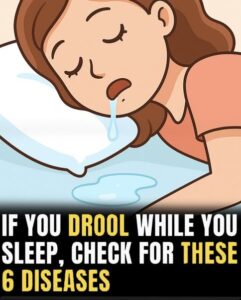Do You Drool While You Sleep? Here’s What It Might Mean

Getting enough rest is one of the most essential things your body needs to function properly. If you want to feel energetic, focused, and positive throughout the day, quality sleep should be a top priority.
Personally, I’ve never had much trouble falling asleep — sometimes even too easily, like when I accidentally nod off in public. But lately, I’ve started wondering: is there any reason to be concerned if you drool while you sleep?
Why Do People Drool During Sleep?
Finding drool on your pillow can be annoying, especially if you share a bed. While drooling is entirely normal for babies up to around two years old, it can be surprising when it continues well into adulthood.
Several things can cause nighttime drooling, such as your sleeping position, certain medications, stress, allergies, or throat issues. In some cases, neurological conditions may also play a role.
According to Tomorrow Magazine, these factors can all contribute, and interestingly, saliva itself isn’t all bad — it helps with digestion and keeps your mouth clean.
Experts at the Cleveland Clinic point out that excessive drooling (known as sialorrhea) can be linked to neurological disorders like stroke, Parkinson’s disease, ALS, multiple sclerosis, cerebral palsy, Down syndrome, and autism.
Is Drooling in Your Sleep Dangerous?
Drooling at night can result from various causes — from posture and dental issues to medication side effects or medical conditions.
However, it’s not always something negative. In fact, some sleep specialists suggest that mild drooling may indicate a deep, uninterrupted sleep cycle, which helps your body recover and promotes overall happiness.
What Happens If Chronic Drooling Is Ignored?
If drooling becomes persistent or excessive, it can lead to health concerns. Constant moisture around the mouth may cause angular cheilitis, a painful condition that creates cracks at the corners of your lips. In more severe cases, saliva might enter the lungs during sleep, increasing the risk of aspiration pneumonia.
That’s why any ongoing or worsening drooling should be discussed with your doctor — just to rule out anything serious.
A Sign of Deep, Restful Sleep
Waking up occasionally with a bit of drool isn’t something to be ashamed of. In most cases, it simply means your body reached the REM phase of sleep — the stage where dreaming occurs and your muscles are relaxed.
During REM sleep, neurotransmitters responsible for movement are temporarily turned off to keep your body still while you dream. When this phase goes undisturbed, it’s a sign your body got the deep rest it needed — and drooling can be a subtle side effect of that.
Sleep: The Hidden Key to Happiness
Research suggests that good sleep may boost happiness even more than a massive pay raise. A study by Sainsbury’s in the UK found that consistent, high-quality rest was the strongest predictor of overall well-being — even more powerful than financial gain.
So, the next time you wake up with a damp pillow, don’t feel embarrassed. It might just be your body’s way of saying, “You slept really well.”
Still, if you’re drooling heavily or developing irritation around your mouth, it’s wise to check in with a healthcare professional.